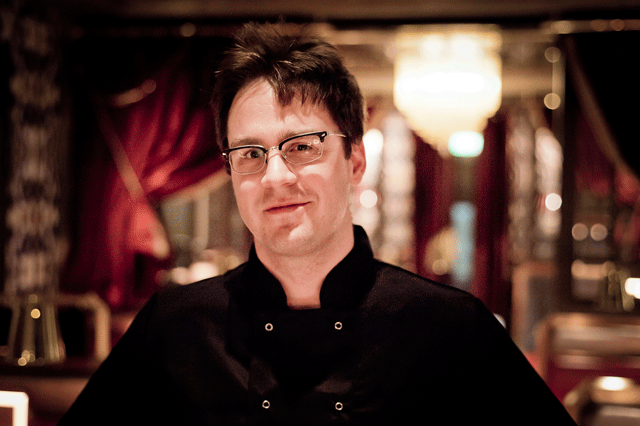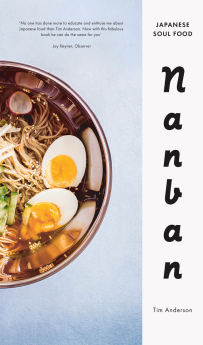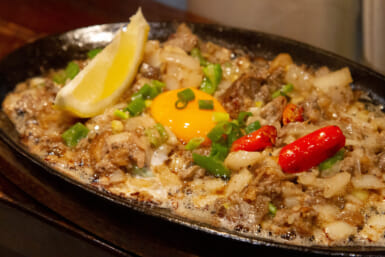Curried lamb cheeseburgers, Kyushu style pork ramen, and avocado and butter bean mousse: these are just some of the innovative creations served up by Tim Anderson during the 2011 series of BBC’s MasterChef.
By Matthew Hernon
The American, who worked as an ALT for the JET program in Kyushu, was the youngest and possibly most unconventional winner ever of the show. So what’s he been up to since and where did his fascination with Asian cuisine come from? Weekender met up with him at the Blue Fin Building in Southwark, London, to find out.
“I wasn’t an otaku or anything but I kind of got into J-Pop and anime during my teens,” he tells us. “Then I saw the Japanese Iron Chef on TV in America and was just amazed. The dishes they came up with were so unique—nothing like I’d seen before. After that I tried to make as much Japanese food as I could. I even studied about it at university, writing a thesis on food museums—my main focus was on the ramen museum in Shin-Yokohama. My appreciation for Japanese food increased further while working as a teacher in Kita-Kyushu; however, at that stage I hadn’t really thought about making a career out of cooking or anything.”
During his time in Japan he met his future wife Laura, a Brit born to Italian and Japanese parents. He moved to the UK with her, where he did a variety of jobs including working as a travel agent, beer salesman and even running a pub before making the decision to apply for MasterChef.
“I did it on a whim,” he says. “The forms only took 20 minutes to fill out so I thought why not? I just like to do things that are fun and interesting. I didn’t really anticipate anything coming of it: I certainly didn’t think I could win it.”
He was wrong. A humble, yet hugely talented contestant, Anderson proved a hit right from the start. Despite describing the experience as “fun but stressful,” he looked relaxed throughout. In the final he blew the judges away with a variety of concoctions including jalapeño marmalade, matcha mayonnaise and truffled lobster. Described in the Guardian as a “wacky molecular gastronomist and a disciple of Heston Blumenthal (Proprietor of the Fat Duck in Berkshire, England—once voted the world’s number one restaurant),” the Wisconsin-born chef was a very popular winner and has done very well out of the show since.
“You don’t get a book deal or any monetary prize for finishing first, however; these are things I’ve acquired because I was on MasterChef,” Anderson says. “It has opened up a lot of doors. I’ve done commercials for companies like Oral B and I was invited by the Japanese Embassy in London to help with an event promoting tourism in Japan after the earthquake; things like that have really surprised me.
More than anything, though, winning MasterChef gets you recognized: sponsors are prepared to take a chance on you because you’ve been on TV. It’s given me the opportunity to open these pop up restaurants around London which definitely wouldn’t have been possible if I hadn’t been on the program. I certainly didn’t imagine all this happening when I was teaching English in Kyushu.”
Tim Anderson on….
The appeal of Japanese food abroad It’s fashionable, interesting and tastes good to Western palates. Things started with sushi—that caught on quickly because people saw it as healthy, colorful and exotic without tasting too weird. Some food from Japan was never going to sit right with Westerners or was always going to be too strange—there’s a reason why sushi caught on first and not natto—but as awareness began to grow, respect for Japanese food increased and as a result people from all over the world were prepared to try a variety of dishes from Japan. There aren’t many countries with that kind of reputation.
English Food Things have changed a lot in the five or six years I’ve been here. I think for a long time England deserved its reputation—the food was really bad. People had a real lack of confidence in their own cuisine and that made others not want to try it. In recent years it’s become fashionable to celebrate local produce amongst professional cooks and that has helped raise the standards. If you focus on getting really good produce then that’s half your work done. The best places are actually outside of London. I think if you go to an average pub in the capital, chances are it won’t be serving great food.
Inspirational Chefs Heston Blumenthal was always a big inspiration. Nobody has done anything quite like him, before or since. He will take ordinary flavors and repurpose them. The way he has introduced psychology and scientific understanding into cooking has been very clever. Another chef I’m a huge fan of is David Chang (founder of the Momofuku restaurant group). He started off with ramen and Taiwanese dishes, but then changed his philosophy. He basically said if something’s good we are going to do it regardless of where it comes from. It’s a great attitude to have and it has worked really well.
Winning MasterChef My strategy was just to have a point of difference. Basically I didn’t want to do what everybody else was doing and that ultimately that worked out for me. It wasn’t just Japanese food: I decided to put all kinds of weird ingredients together in a unique way in order to keep the judges interested and to stay in as long as I could. I didn’t think I would win using that strategy. I wasn’t necessarily the best chef on the show, but I was probably the one coming up with the strangest dishes and that seemed to interest the judges.
You can find a copy of Tim Anderson’s “Nanban: Japanese Soul Food” on Amazon.










